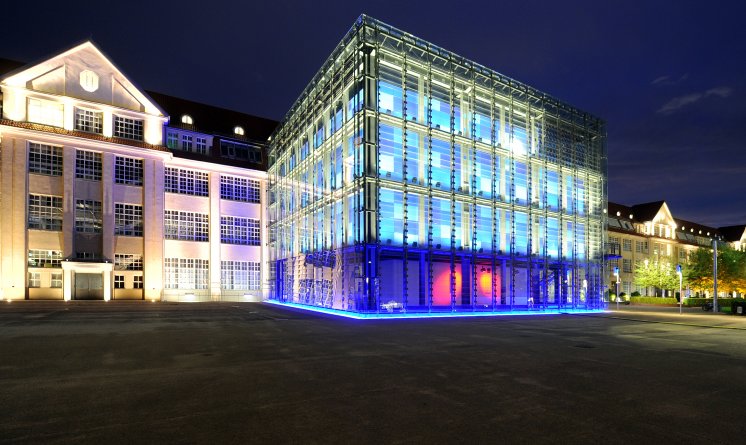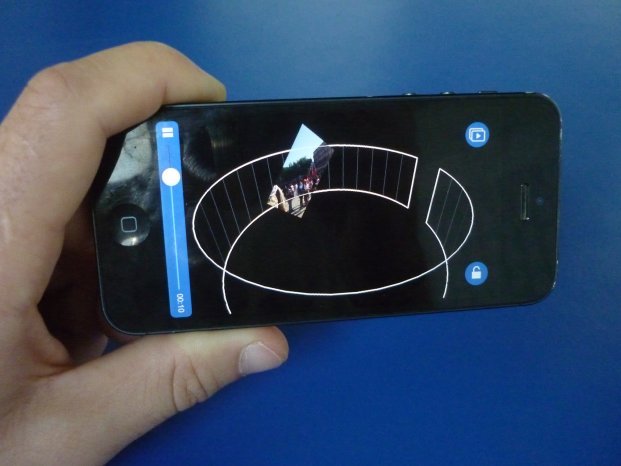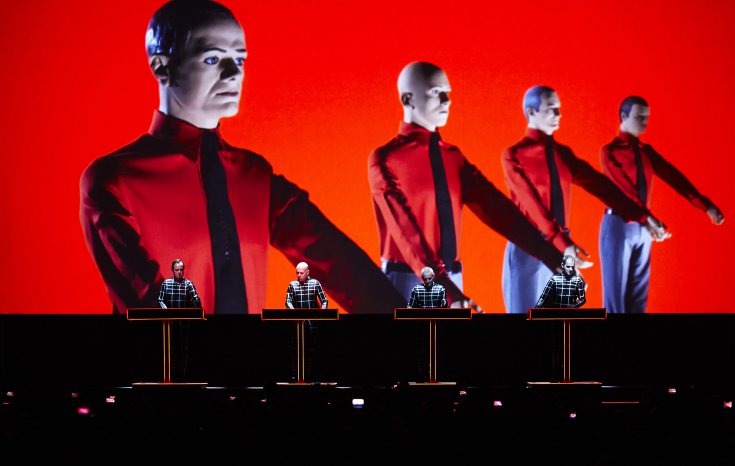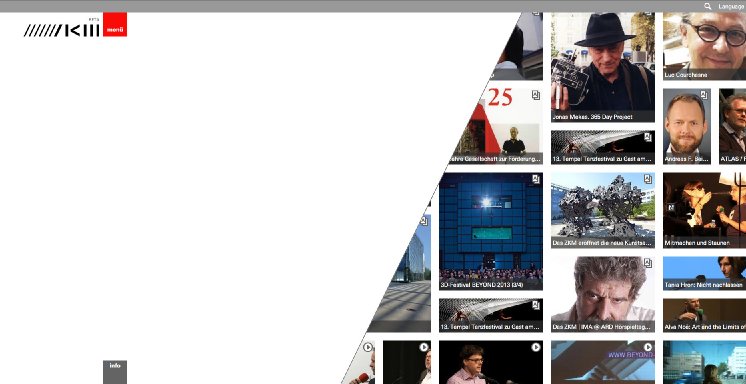The initial ideas for the ZKM began to emerge in the mid-1980s, coincidently with the massive appearance on to the scene of the new information and communications technologies. With the founding of a new institution, the leading idea was to provide the conditions under which artists could experiment with new media, and to ensure public participation and critical artistic reflection on the rapidly developing new technologies. The newly created center was committed to the future of the art, media and society, and the ZKM's openness to change constituted an integral aspect from its inception. A vital dialog was to be initiated on art and society, art and economy, but also on the arts themselves: by way of reciprocal reflection, the ZKM was to be open and flexible in all directions whereby the aim was to be immediately receptive to and take up new currents and tendencies.
Revolutionizing the Arts
The theoretical foundations of the ZKM are to be understood today as the consequence of the revolutions that irrupted during the 1960s: the political and social revolutions, the artistic and technical revolutions, the sexual revolution, the feminist movement and the rock and pop music movement:
"When asking about what the most important elements of artistic and technical revolutions were during the 1960s, we answer: the appearance of action art and the ascendency of the New Media." (Peter Weibel)
Action art, as it developed between the 1960s and 1980s, was soon no longer solely limited to performances by artists, but extended to public participation. Interactivity and participation were to become important instruments of artistic and social rebellion. These actions were augmented by the new media. They not only formed part of the augmented concept of the image but, from the 1960s and above all the 1990s, assumed a crucial role in the transformation of the work and the concept of art itself.
Cross-genre Art Production
From the outset, the ZKM's primary focus has been on media and video art. The various multimedia shows, already prior to the move into the new spaces, exhibited interactive installations, virtual reality, panoramic environments and electronic music. Projects for the development of netculture and social media (net_condition, 1999), anticipated current themes and problems, as can be seen in surveillance (CTRL [Space], 2002), the transformation of youth cultures (Coolhunters, 2005) or the increasing action and performance possibilities of the individual on the Internet (YOU_ser. The Century of the Consumer, 2007). In this connection, the history of interactive art (The Algorithmic Revolution, 2004) was no less ignored than was research undertaken on the conservation of video and digital art (40 Years of Video Art (2006), Digital Art Conservation 2010- 2012). In addition to the numerous monographic exhibitions by young artists such as Olafur Eliasson (2001) and Erwin Wurm (2003), as well as Harun Farocki (2004) and Elmgreen and Dragset (2009), who were awarded their first museum (solo) exhibitions in Germany at the ZKM, in 2004, the ZKM also showed Gego, who was represented at the documenta in 2012. With large-scale thematic exhibitions, such as Iconoclash (2002) and FUTURE CINEMA (2002), Light Art from Artificial Light (2006) or bit International (2009), the ZKM has repeatedly initiated new impulses and approaches, the impact of which can be read in subsequent exhibitions.
With a series of exhibitions on philosophers and media theorists, such as Foucault (2002), Deleuze (2003), Virilio (2007) and Bense (2010), but also Jean Baudrillard, the latter of whom actively accompanied the ZKM until his death, the ZKM continues to build bridges between the disciplines. The necessary critical examination of ecology, of climate change or science is reflected in the well-visited productions and events, such as the media opera Amazonas (2005), and the symposium Molecular Aesthetics (2011). Social and political themes have shifted to the foreground in recent years - beginning with the legendary exhibition Making Things Public (2005) together with Bruno Latour, The Global Contemporary (2011) through to global aCtIVISm (2013). This thematic spectrum will be pursued in GLOBALE 2015.
The Panorama of 1960s Revolutions
To mark the occasion of its 25th anniversary by way of artist approaches the ZKM once again looks back at the formative ideas which led to its foundation. With the exhibition Beuys Brock Vostell (May 24-November 9, 2014) we show works displaying programmatic congruities by three key representatives of action art in Germany who often made joint appearances.
With Claus Bremer: mitspiel. theater und poesie 1949−1994 (July 5-Oct. 5, 2014) we recall how the idea of public participation emerged coincidentally in theater. What Beuys, Brock, Vostell represent in Germany is epitomized, in France, in the person of Jean-Jacques Lebel. In over sixty happenings since the 1960s, the activist Lebel extended the spectrum of free expression in painting, poetry and action art. For the aspect of media art, we have selected a key representative of American film art: Jonas Mekas (365 Day Project, July 26-November 9, 2014). Mekas has been the central figure of independent American film since the 1960s. With Lynn Hershman (CIVIC RADAR. Lynn Hershman Leeson - the Retrospective, December 13, 2014-29. March, 2015), the ZKM shows one of the most important representatives of the feminist revolution. With her photomontages, feature films, (video) installations, Internet projects and numerous media performances, Hershman has made decisive contributions to media art.
Digital Offshoot: The new Website
Concurrently with the retrospective on the institution's foundations, with the launch of the new website we witness a current technological production which facilitates a new mode for accessing the continually increasing flow of information - such as the project ArtOnYourScreen (AOYS). One essential characteristic of the concept of the new online offshoot lies in the diverse data networking and contextualization, which runs through all areas of the website. Persons, exhibitions, events, productions, publications, works, videos and audio files produced since 1989, are integrated with one another. Various thematic focal points of the ZKM and a subject catalog further contextualize the content. Furthermore, the website provides information on a long list of persons who have designed and influenced the ZKM from its inception. The archive is continuously expanding and supplemented by new content.
New DevelopmentsThe ZKM also presents itself on the anniversary weekend as a platform for technical innovation. The ZKM | Institute for Visual Media has developed a new method of recording and reproducing images, namely, the Motion Picture 2.0 technology, which can be installed as an App on one's own Smartphone. The revolutionary aspect here is that the camera orientation is also recorded and can be physically experienced afterwards in the ZKM_PanoramaLab. The full effects of the new technology will be shown for the first time in the panoramic projection environment on the anniversary weekend.
One augmented possibility of Smartphone usage is provided by headflat, a development which is scheduled for presentation at the ZKM on September 12. The Smartphone no longer has to be handheld, but is secured in a holder. Augmented reality applications or interactive games can be controlled through body movement. These developments all demonstrate that the ZKM is an innovative institution which, though recognized worldwide, is at the same time part of the revolutions to which it owes its foundation.





